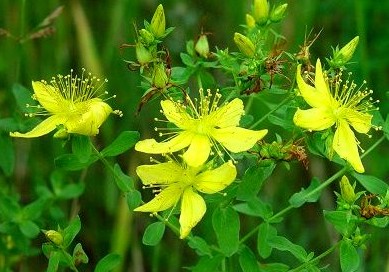 St.
John's Wort has recently become one of the heavyweight herbs in medicine,
mostly due to it's reputed anti-depressant effects. Lesser known medicinal
attributes of this plant include usefulness as an antiseptic, pain killer,
and anti-viral agent.
St.
John's Wort has recently become one of the heavyweight herbs in medicine,
mostly due to it's reputed anti-depressant effects. Lesser known medicinal
attributes of this plant include usefulness as an antiseptic, pain killer,
and anti-viral agent.
Externally, St. John's Wort can be made
into an Ointment
for bruises, wounds, burns, hemorrhoids, sunburn, herpes sores, varicose
veins, sciatica, and nerve pain. An
Oil
can be made to rub on areas affected by arthritis and rheumatism, and massaged
around the spinal cord for back pain symptoms.
Internally, St. John's Wort is believed
to be of benefit for symptoms of depression, anxiety, cough, digestion,
bronchial problems, diarrhea, menstrual problems, fatigue, flu, gout, insomnia,
irritability, and ulcers. As an anti-depressant, it may take some
time when used regularly to have any noticeable effects. A
Tea
can be made for any of the above symptoms using the leaves or flowers, and
the dosage should be 1-2 cups morning and night until the symptoms retreat.
Capsules can also be made from the flowers or leaves after drying and pulverizing
into a powder. See the link on How to Make Herbal Capsules below for
instructions.
There are some drawbacks to taking St.
John's Wort, so do consider these before embarking on a self-medication
regimen with this herb. A study has shown that it may interfere with
some of the drugs used in cases of HIV and immune suppressants used in transplant
patients. If either of these categories fit your situation, please
consult your doctor before taking any medications containing St. John's
Wort. Side effects are also reported, including photosensitivity and
a mild nauseated feeling that usually corrects itself after a few weeks
of taking the medication. Lastly, in some people a rise in blood pressure
after taking the herb has been reported, and there is one study that suggests
that it might interfere with birth control pills, although there have been
no reports of unplanned births associated with its use.